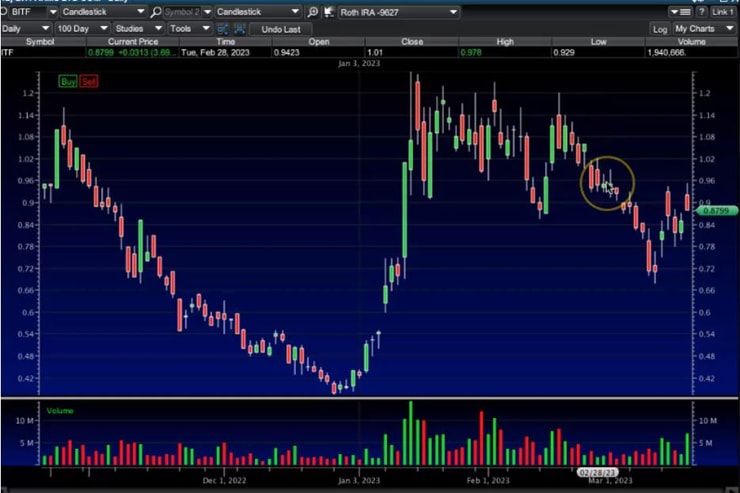It seems like anywhere you turn, you hear about the banking crisis.
It created volatility in the markets…and has led to a lot of uncertainty.
Safety first is one of my primary goals…and something I stress to my students.
And that’s why I haven’t traded any banking stocks.
You see, I don’t want trading to be stressful.
But don’t be mistaken. Just because I’m not directly playing banking stocks doesn’t mean I’m not taking advantage of the opportunities.
I am just using a different approach.
I find it to be significantly less stressful but just as potentially profitable.
In today’s lesson, I’ll explain my strategy and how I recently profited from the banking crisis without trading any bank stocks.
An Unlikely Winner In The Banking Crisis

2025 Millionaire Media, LLCThe financial sector has had a tough twelve months. Before the banking crisis, cryptocurrencies were in free fall.
Many of the top crypto firms and exchanges got decimated in late 2022, most notably FTX, the world’s second-largest crypto exchange, which filed for bankruptcy.
Riddled by scandals and uncertainty, crypto investors saw the bubble pop as bitcoin dipped under $16K, a drop of 77% from its all-time high of $67,800.
Bitcoin was dead in the water… barely trading above $20K on March 10, 2023…
But thanks to the collapse of Silvergate, Silicon Valley Bank, Signature Bank, the deterioration of regional banks, and the demise of Credit Suisse…it was again viewed as a safe haven investment.
Ironic…I know.
Bitcoin prices surged from $20K to $28K in less than two weeks.
And while I don’t trade cryptocurrencies…I have no problem trading stocks related to them.
How I Played The Banking Crisis Without Trading A Banking Stock
Mondays are historically bad days for stocks.
Why?
Because we have the entire weekend to read about all the negative things that are happening in the world, it typically makes investors nervous and scared. And because the stock market isn’t open on the weekends, the first reaction on Monday is to sell first and ask questions later.
On Friday, I thought if people read about all the problems banks faced over the weekend…and saw crypto raging…it would be bullish for crypto stocks on Monday.
So late on Friday, I bought shares of Bitfarms Ltd. (BITF), a cryptocurrency mining company. By the way, this is a weekend strategy I teach to all my students.
For the most part, crypto stocks can be very volatile, and many of them were getting toward their yearly highs…
I picked BITF because it was a laggard. Meaning that it didn’t go up as much as the other crypto stocks. And I thought it had some catching up to do.
I got in at around $0.93 on Friday and out on Monday morning at $0.972.
That’s nearly a 5% gain in a trade I thought was relatively low risk.
It was nothing huge…but a nice solid single over the weekend thanks to the continued banking crisis and crypto benefiting as a result.
In this market, I want to be conservative and play for singles.
Once things heat up again…I’ll get more aggressive.
Bottom Line

2025 Millionaire Media, LLCBig market themes can impact several sectors. Bitcoin stocks have benefited during the banking crisis. Instead of trading risky banking stocks, I decided to play it safe and go with a crypto stock using my weekend strategy.
Next time you see a big theme in the market, ask yourself what some other ways to play it without going directly into the fire are…
If you’d like to learn more about the mentoring program and how I’ve helped over 30 of my students, on their path to become millionaire traders, then click here.









Leave a reply